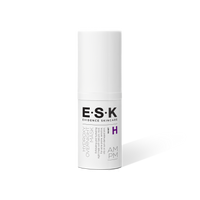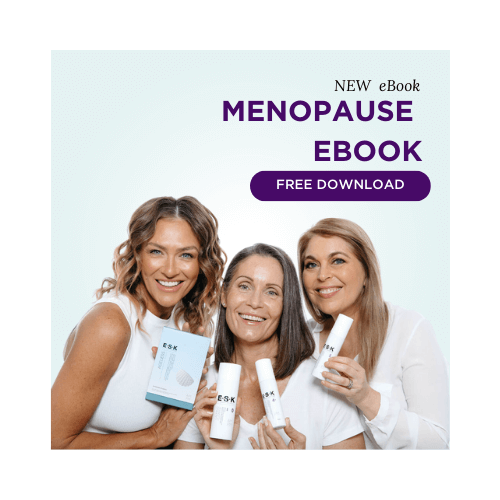
The ESK blog
From Dr Ginni: Should I Exfoliate If I Have Acne?
22 July 2021
Dana Raffoul
SHOULD I EXFOLIATE IF I HAVE ACNE?
No!! Well, not with the kind of exfoliator you see on the market- the kinds of scrubs my daughters find on Instagram.
Not that I knew that at 14. My mum took me to the local upscale department store for some much- needed help with my greasy pizza face. I was given a special soap bar, an alcohol-based toner and a scrub made out of crushed up apricot kernels. I was to use this twice a week to help exfoliate my skin. Wow if only I knew then what I know now!
Using the combination of a physical exfoliating scrub and an alcohol-based toner is a car smash. Which might explain why my acne just got worse until I turned about 18.
So as all our ESK family now know, both soap and alcohol-based toners disrupt the pH of the skin and dry it out, increasing trans-epidermal water loss and making all inflammatory skin conditions from acne and rosacea to eczema and dermatitis worse. But what about exfoliating? After all, acne is a condition in which there is an overproduction of keratin, which causes plugging of the pores and the creation of blackheads and pimples. Exfoliation has got to be good right?
Right! It’s true we certainly want to remove keratin plugs as part of your treatment for acne. The question is how?
HOW TO REMOVE KERATIN PLUGS AS PART OF YOUR TREATMENT FOR ACNE?
Physical exfoliation
My apricot kernel scrub probably irritated my skin, causing more inflammation and therefore making my skin more red, inflamed, more likely to overproduce keratin and to be unable to fight off an invasion by the bacteria, Propionibacterium acnes. Ditto scrubbing with microbeads, an at home rough face scrubber or even harsh rubbing with a damp face cloth.
Some people have luck with clinician delivered physical exfoliations. Microdermabrasion is a very superficial exfoliation technique done in some salons and surgeries. Aluminium crystals are gently blasted onto the skin, removing the top layer of skin. You do go quite red afterwards and you start peeling 2 to 3 days later.
Chemical exfoliation
This is where chemicals are applied to the skin to gently remove the excess keratin. Hydroxy acids have been used really effectively in trials.
Glycolic acid: Most popular Alpha Hydroxy acid used in the treatment of acne (and pigmentation from acne), as it quickly crosses the deepest layers of the skin- the stratum corneum. Used at long concentrations, it not only gently cleaves the bonds between keratin clumps but is also anti-inflammatory and helps get rid of pigmentation. Another commonly used Alpha Hydroxy acid is Lactic acid, which is less effective and less irritating than Glycolic Acid.

Smooth Serum
An Alpha Hydroxy Acid exfoliating serum for daily night use.
- Smoother skin
- Evens out skin texture
- Promotes skin cell turnover
Salicylic acid: Often referred to as Beta-Hydroxy Acid (BHA) has both anti inflammatory and comedolytic (pimple busting) properties.

Hydroxy Overnight Mask
Used nightly, they don’t tend to cause inflammation and can even enhance the effectiveness of vitamin A, which will help actively treat acne-prone skin.
Chemical exfoliation with Alpha Hydroxy acids (AHA) or salicylic acids using low concentrations can be done at home as part of your nightly routine or you can get them as a peel at higher concentrations through your beautician or dermatologist. In the clinic, the results can be very dramatic indeed and your face might be bright red and inflamed for up to a week afterwards.
SO THE BOTTOM LINE IS:
Exfoliation is a worthwhile part of the management of acne. But the only exfoliation to do at home is a gentle Hydroxy acid leave-on exfoliator.
Ginni xx
References
- https://www.ncbi.nlm.nih.gov/pmc/articles/PMC6360964/
- https://www.ncbi.nlm.nih.gov/pubmed/25811473
- https://www.ncbi.nlm.nih.gov/pubmed/28330776
- https://www.ncbi.nlm.nih.gov/pubmed/20825257
- https://www.ncbi.nlm.nih.gov/pmc/articles/PMC3780801/
- https://www.ncbi.nlm.nih.gov/pmc/articles/PMC2921746/
- https://www.ncbi.nlm.nih.gov/pubmed/8680784
- https://www.ncbi.nlm.nih.gov/pmc/articles/PMC3366450/
- https://www.ncbi.nlm.nih.gov/pmc/articles/PMC5429107/

